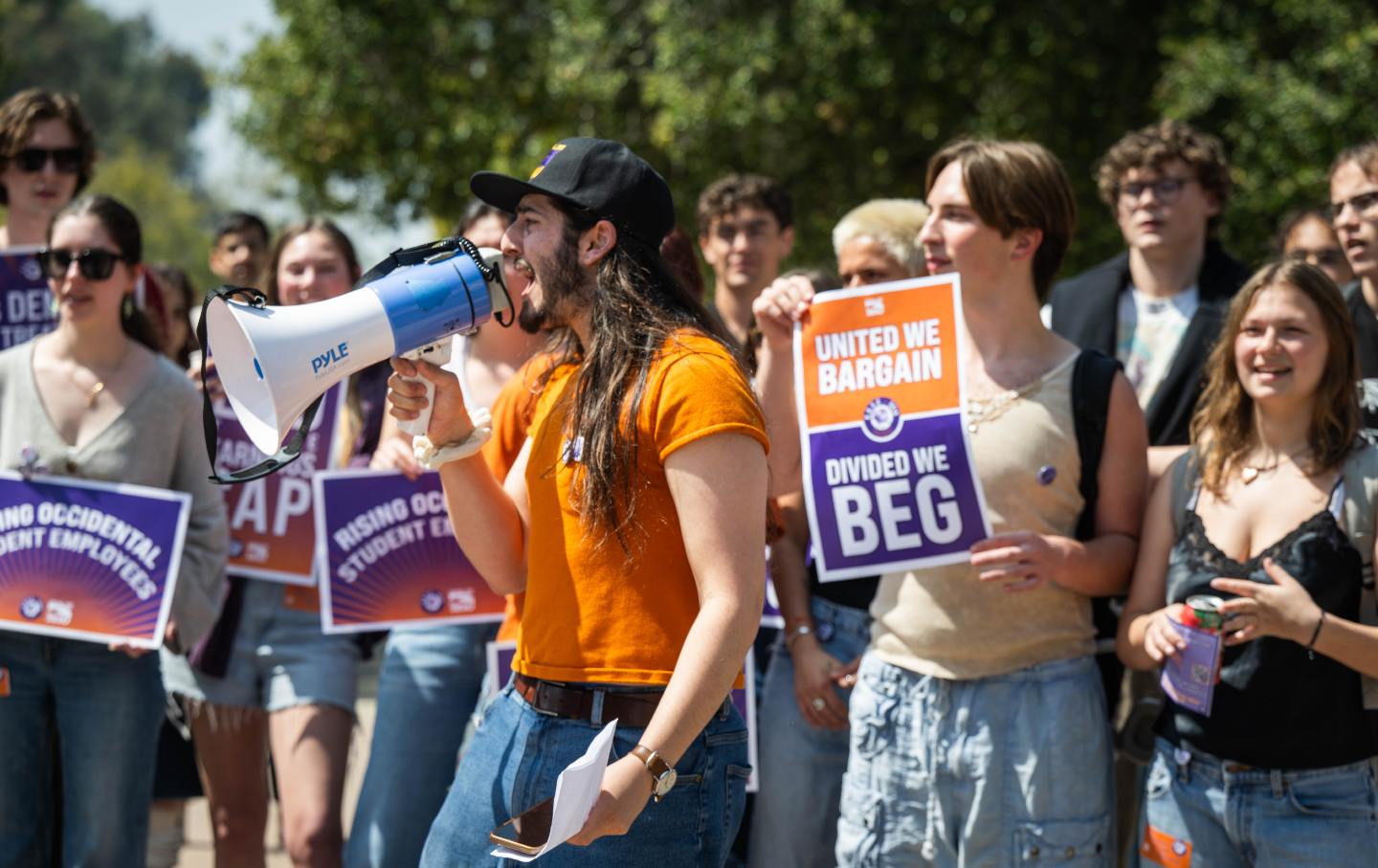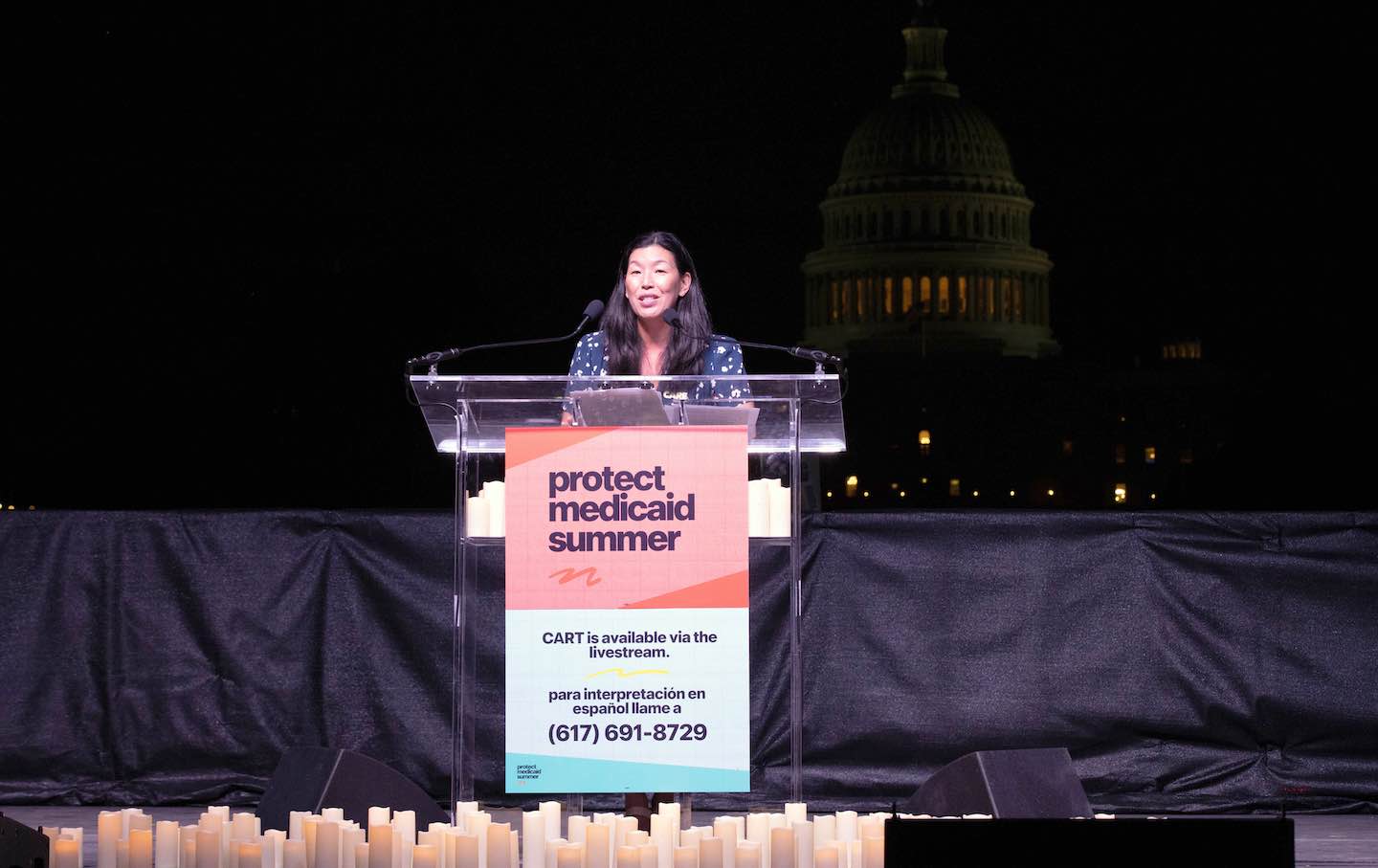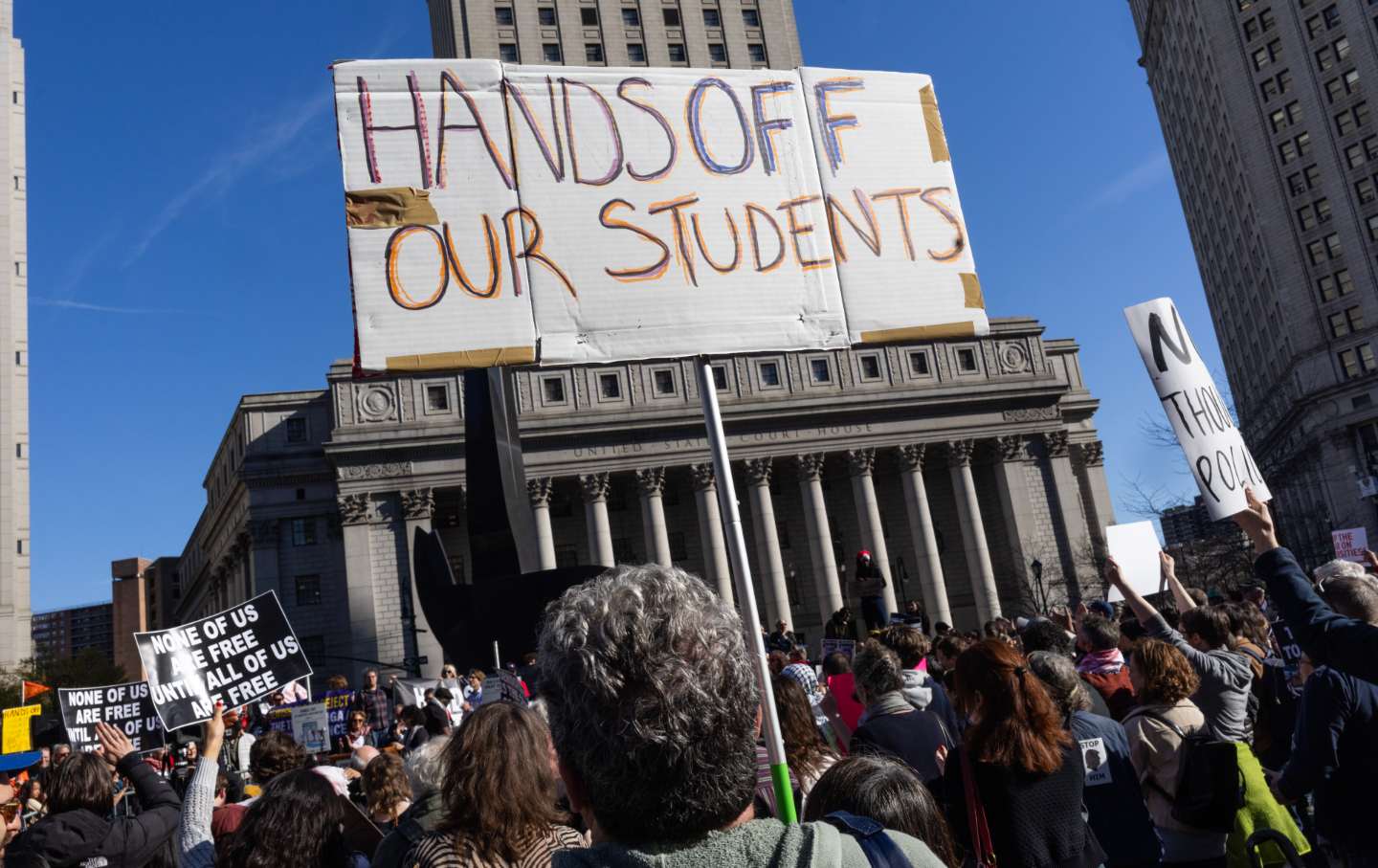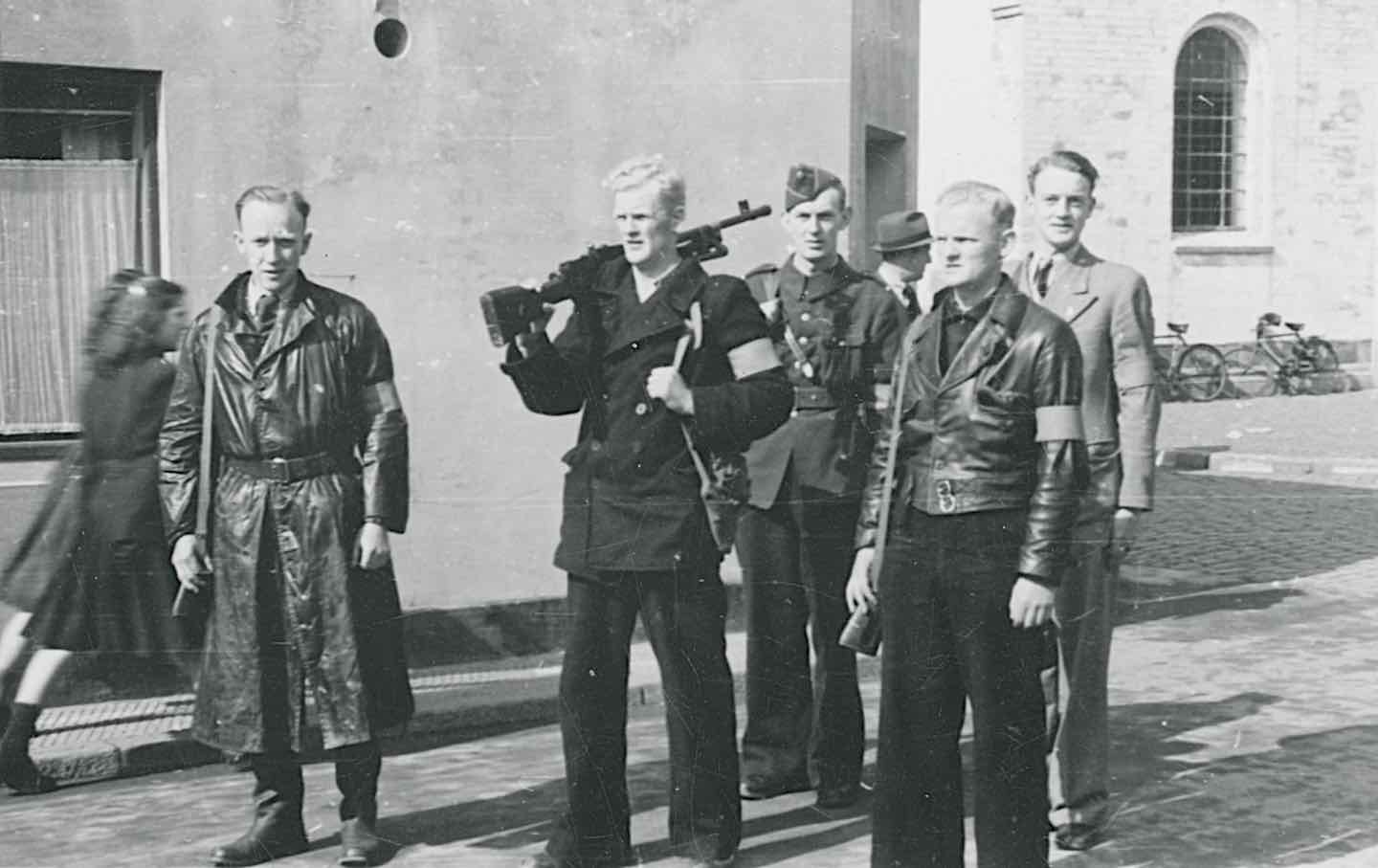Under Trump, Student Labor Organizers Face New Challenges
Anticipating a rollback of recent NLRB precedent, some unions have withdrawn petitions for recognition, looking for other paths to continue their work.

Student workers and their supporters at Occidental College as they launch a union campaign to join SEIU Local 721 in 2024.
(Sarah Reingewirtz / Getty)
When Michael Ziegler started his PhD at Brown University in 2019, his union shop consisted entirely of graduate students. But in the past few years, three undergraduate bargaining units totalling about 500 students were formed at Brown, drastically expanding the size and reach of the union. Nationally, from 2020 to 2025, undergraduate unions went from two to more than two dozen, with many more in the works.
But whether this momentum can continue under Donald Trump’s National Labor Relations Board is unclear, as student organizers anticipate changes in their bargaining rights and a landscape far less friendly to collective bargaining. Some unions anticipate a rollback of recent NLRB precedent—recognizing undergraduate workers as primarily students rather than employees. These unions have withdrawn petitions for recognition and are looking to other paths to continue their work, including statewide labor law changes and other forms of collective power.
The employee status of student workers—such as graduate teaching assistants, undergraduate resident assistants, and other campus workers—will be determined by the NLRB, the agency that decides how the National Labor Relations Act is applied to protect employees and oversees petitions for union recognition. The NLRB’s position has fluctuated under different administrations. Those arguing against recognition say that student workers are primarily students, not workers, while organizers argue that their work is crucial for the functioning of their institution’s facilities, residence halls, and classrooms.
In 2016, under a ruling prompted by Columbia University, the NLRB granted students the right to be recognized as employees and unions. But during Trump’s first term, this status was almost overruled under a proposal which claimed to “bring stability to an area of federal labor law in which the Board, through adjudication, has reversed its approach three times since 2000.”
Under Biden, the proposal was withdrawn, paving the way for more than a dozen new undergraduate student unions in the following years, resulting in pay raises, representation at labor meetings, and protection of international students. At Swarthmore College, for example, the first contract for resident assistants included a 21 percent pay raise.
Since the decision, unions have spread like “wildfire” thanks to the younger generation’s accessibility on social media and the constant demands of an RA role, according to Nick Galipeau, secretary-treasurer of Office and Professional Employees International Union Local 153, which has organized many of them. “The social network among students across campuses is incredible,” Galipeau said. “When we ratify contracts at one university, we almost immediately get leads from other university groups and, at this point, we don’t have enough capacity to organize the amount of workers that want to be in the union.” Galipeau said he is involved in six to 10 new organizing movements, including petitions for recognition and election, and is in contact with another six groups—a big increase in interest over the past three months.
In July, Cornell PhD student Russell Burgett—represented by the National Right to Work Legal Defense Foundation—filed a charge with the NLRB in opposition to the school’s graduate student union that, if approved, could strip it and similar unions of their power. The NLRB currently lacks a quorum: two members on a five-person board and a permanent general counsel. But once Trump’s nominees are added, sometime in late 2025, the NLRB is expected to make its decision on student-employees before the end of the year. The scenario student organizers most worry about is the NLRA in its entirety being overturned, leaving private union law up to states, as was the case before the 1930s.
A Rhode Island bill passed June 9, led by the state’s AFL-CIO president Patrick Crowley, anticipates this scenario by changing the definition of who is an employee. Historically, public sector unions have fallen under state law, while the private sector falls under federal law. There have been exceptions for groups not employed by the state who are excluded from the NLRB, such as healthcare workers. “We thought it made sense to make sure that we updated our state labor relations act to say that if you are currently organized under the federal law and that jurisdiction is taken away, you can still organize under the state labor relations act,” Crowley said.
Ziegler, who leads 1000 unionized graduate students and three units of undergraduates as the president of Local 6156, worked with the AFL-CIO on the state effort. He says they are operating on the idea that unions can’t rely on federal law, and need to fall back on collective power. “We are going back to basics in a way, to something that was really the case for the majority of the history of organizing in the United States where you have a federal apparatus really hostile to the rights of workers and that doesn’t stop the organizing. It happened before, it will continue to happen,” Ziegler said.
“Regardless of whether the National Labor Relations Act recognizes student workers, we believe that every worker has the right to be part of a union,” Galipeau said. “Whether the NLRA or the NLRB says it’s legal or not for student workers to be union members or for students to be considered employees, we’re gonna continue to represent them. Workers coming together and organizing is what unions are all about.”
Despite the new state protections, Brown, like other student unions, including Local 153, is refraining from filing new Unfair Labor Practice charges with the NLRB to avoid an unfavorable outcome setting precedent. The graduate union’s bargaining of its most recent contract in 2023 was informed by the possibility of a second Trump administration, including the push for a noncitizen worker article that created an assistance fund for immigration-related legal fees, supported students’ ability to work if barred from entry, and protected personal information.
More unions are learning to operate absent any government protected modes of organizing. United Campus Workers (UCW), with 7,000 members nationwide, organizes wall-to-wall: all workers from faculty to students to facilities. It relies on collective actions such as rallies and petition signings organized by a student-led committee that reaches out to the wider school body to gain support and put pressure on administrators, rather than a legal right to bargain and strike. which often does not exist for public colleges.
Organizers at Berea College in Kentucky—a private college where students pay no tuition and hold jobs—withdrew their petition in January 2025 from the NLRB citing the risk of changed precedent under Trump. The group filed for recognition in March 2024 with the Communications Workers of America, which is affiliated with UCW; NLRB had never held a union election because of delays due to a legal challenge from Berea’s administration. After three years of fighting to be recognized as a union under the federal labor law, they shifted to organizing under UCW principles. Organizing activities remain the same, such as petition campaigns and rallies, but without strike protections or other legal shields in case of retaliation, organizers need to build enough student pressure to win demands.
“Even though we don’t have legal recognition, we are still acting as a union because we have collective power and more of a community,” said Rhea Clayton, a senior at Berea.
Clayton said that while petitioning for recognition, they faced slowdowns, in part from Berea College’s challenging the right to unionize when they didn’t pay tuition. Clayton said she received $5.30 an hour when starting her job, and now makes $7.50, just over Kentucky’s minimum wage. However, she said some student workers are paid under minimum wage because they are not classified as employees. Berea College denies that students are underpaid. Rather than receiving a wage, students are given a non-taxed federal scholarship, which equates to $34 hourly pay. But if unionized students are instead classified as employees, the Berea administration said, that federal financial aid may be lost. “We believe that redefining our Work College program as an employment program, through efforts such as unionization, would lead to students’ loss of financial aid,” said Berea College president Cheryl Nixon in a statement shared with The Nation. “We have a shared responsibility to our current and future students to protect and preserve our unique Work College financial aid model.”
In an e-mail to the campus community in March 2024, President Nixon acknowledged the unionization efforts at colleges across the country, saying those values align with the college’s. However, she said unionization at Berea would be “structurally incompatible with our unique Work College model,” as it would set up a conflict between the NLRB and the Department of Education, which defines Berea members as students receiving scholarships. Those were among the arguments Berea administration made at a hearing in late May, but a decision was not reached before students pulled the petition.
Popular
“swipe left below to view more authors”Swipe →Another UCW Kentucky chapter at the University of Louisville won Covid safety practices, organized actions in support of DEI, launched an overcompliance hotline, and is currently mobilizing to raise graduate student compensation. The living-wage petition is an example of how UCW builds power through escalation and widespread support. These efforts are ongoing; only a few students are members, and many have not heard of UCW. Additionally, the political environment has produced a chilling effect on campus. “The fear that this administration has instilled in people is a barrier to organizing,” said the Louisville organizer who chose to remain anonymous because of concerns over a family member’s immigration status. “With the fear placed in international students and in all of us, are we gonna lose funding because Trump hates higher education and is cutting funding to universities, and that makes us just want to cling to what we have instead of fighting for a better future. It’s that scarcity mindset and that’s how these regimes work.”
The UofL organizer is hoping to mobilize people who have the privilege of citizenship. The new graduate student platform demands increased compensation, salary transparency, and a seat at the table where workplace rules are devised. The UCW Berea Chapter has been working on campaigns including anti-discrimination, revised sick leave, and tabling and outreach. After the January petition pull, Berea College administration held 15 open-community meetings titled “Building Together” to discuss Work College program reform. Berea administration said 300 students attended these sessions, out of a 1,500-student body.
Clayton is optimistic about organizing new members and building collective power, despite pushback from the Berea administration. She said more time is now devoted to outreach and collective work, rather than collecting union cards for legal recognition.
“We really want to have a seat at the decision-making table,” Clayton said. “Since we make the college work, we deserve to have an equal say in what’s happening with our own labor positions and what’s going on.”
Take a stand against Trump and support The Nation!
In this moment of crisis, we need a unified, progressive opposition to Donald Trump.
We’re starting to see one take shape in the streets and at ballot boxes across the country: from New York City mayoral candidate Zohran Mamdani’s campaign focused on affordability, to communities protecting their neighbors from ICE, to the senators opposing arms shipments to Israel.
The Democratic Party has an urgent choice to make: Will it embrace a politics that is principled and popular, or will it continue to insist on losing elections with the out-of-touch elites and consultants that got us here?
At The Nation, we know which side we’re on. Every day, we make the case for a more democratic and equal world by championing progressive leaders, lifting up movements fighting for justice, and exposing the oligarchs and corporations profiting at the expense of us all. Our independent journalism informs and empowers progressives across the country and helps bring this politics to new readers ready to join the fight.
We need your help to continue this work. Will you donate to support The Nation’s independent journalism? Every contribution goes to our award-winning reporting, analysis, and commentary.
Thank you for helping us take on Trump and build the just society we know is possible.
Sincerely,
Bhaskar Sunkara
President, The Nation
More from The Nation

On the Power of Small Acts of Noncompliance On the Power of Small Acts of Noncompliance
At a moment when large-scale resistance can feel futile, there are other ways to oppose, engage, and fight back.

Chris Smalls Speaks Out After His Journey to Gaza Chris Smalls Speaks Out After His Journey to Gaza
In an interview, the union organizer talks about joining the Freedom Flotilla, confronting Israeli forces, and solidarity between Palestine and the US labor movement.

It’s Our Turn to Build a New System of Care It’s Our Turn to Build a New System of Care
We have the chance to shape the future by building a system of care that leaves no one behind.
Ai-jen Poo for The Nation

If We Want to Save Public Health, We Need to Get Out of Our Bubble If We Want to Save Public Health, We Need to Get Out of Our Bubble
The struggle to save public health and biomedical research in the US must be seen as part of a global battle against antidemocratic forces.

Countering Authoritarian Takeover With the Labor Movement Countering Authoritarian Takeover With the Labor Movement
Alex Han of "In These Times" and Tarso Luís Ramos speak about the vital role of worker organizing in an age of growing authoritarianism.

The Danes Resisted Fascism, and So Can We The Danes Resisted Fascism, and So Can We
Danish resistance didn’t arrive all at once during World War II. But taken as a whole, the Danes’ actions are a testament to what’s possible when we work together to fight fascism...


